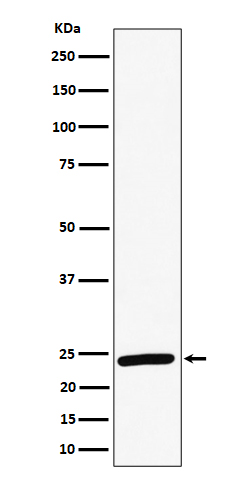RAB8A Antibody
Rabbit mAb
- SPECIFICATION
- CITATIONS
- PROTOCOLS
- BACKGROUND

Application
| WB, IHC, FC, ICC |
|---|---|
| Primary Accession | P61006 |
| Reactivity | Rat |
| Clonality | Monoclonal |
| Other Names | MEL; Mel transforming oncogene; Oncogene c mel; RAB8; RAB8A; |
| Isotype | Rabbit IgG |
| Host | Rabbit |
| Calculated MW | 23668 Da |
| Dilution | WB 1:500~1:2000 IHC 1:50~1:200 ICC/IF 1:50~1:200 FC 1:50 |
|---|---|
| Purification | Affinity-chromatography |
| Immunogen | A synthesized peptide derived from human RAB8A |
| Description | May be involved in vesicular trafficking and neurotransmitter release. Together with RAB11A, RAB3IP, the exocyst complex, PARD3, PRKCI, ANXA2, CDC42 and DNMBP promotes transcytosis of PODXL to the apical membrane initiation sites (AMIS), apical surface formation and lumenogenesis. Together with MYO5B and RAB11A participates in epithelial cell polarization. |
| Storage Condition and Buffer | Rabbit IgG in phosphate buffered saline , pH 7.4, 150mM NaCl, 0.02% sodium azide and 50% glycerol. Store at +4°C short term. Store at -20°C long term. Avoid freeze / thaw cycle. |
| Name | RAB8A |
|---|---|
| Synonyms | MEL, RAB8 |
| Function | The small GTPases Rab are key regulators of intracellular membrane trafficking, from the formation of transport vesicles to their fusion with membranes. Rabs cycle between an inactive GDP-bound form and an active GTP-bound form that is able to recruit to membranes different sets of downstream effectors directly responsible for vesicle formation, movement, tethering and fusion. That Rab is involved in polarized vesicular trafficking and neurotransmitter release. Together with RAB11A, RAB3IP, the exocyst complex, PARD3, PRKCI, ANXA2, CDC42 and DNMBP promotes transcytosis of PODXL to the apical membrane initiation sites (AMIS), apical surface formation and lumenogenesis (PubMed:20890297). Regulates the compacted morphology of the Golgi (PubMed:26209634). Together with MYO5B and RAB11A participates in epithelial cell polarization (PubMed:21282656). Also involved in membrane trafficking to the cilium and ciliogenesis (PubMed:21844891, PubMed:30398148). Together with MICALL2, may also regulate adherens junction assembly (By similarity). May play a role in insulin-induced transport to the plasma membrane of the glucose transporter GLUT4 and therefore play a role in glucose homeostasis (By similarity). Involved in autophagy (PubMed:27103069). Participates in the export of a subset of neosynthesized proteins through a Rab8-Rab10-Rab11-dependent endososomal export route (PubMed:32344433). Targeted to and stabilized on stressed lysosomes through LRRK2 phosphorylation (PubMed:30209220). Suppresses stress-induced lysosomal enlargement through EHBP1 and EHNP1L1 effector proteins (PubMed:30209220). |
| Cellular Location | Cell membrane; Lipid-anchor; Cytoplasmic side. Golgi apparatus. Endosome membrane. Recycling endosome membrane. Cell projection, cilium. Cytoplasmic vesicle, phagosome. Cytoplasmic vesicle, phagosome membrane {ECO:0000250|UniProtKB:Q92930}; Lipid-anchor {ECO:0000250|UniProtKB:Q92930}; Cytoplasmic side {ECO:0000250|UniProtKB:Q92930}. Cytoplasm, cytoskeleton, microtubule organizing center, centrosome, centriole {ECO:0000250|UniProtKB:P55258}. Cytoplasm, cytoskeleton, cilium basal body. Midbody. Cytoplasm, cytoskeleton, cilium axoneme. Cytoplasm Lysosome. Note=Colocalizes with OPTN at the Golgi complex and in vesicular structures close to the plasma membrane (PubMed:15837803). In the GDP-bound form, present in the perinuclear region (PubMed:12221131). Shows a polarized distribution to distal regions of cell protrusions in the GTP-bound form (PubMed:12221131). Colocalizes with PARD3, PRKCI, EXOC5, OCLN, PODXL and RAB11A in apical membrane initiation sites (AMIS) during the generation of apical surface and lumenogenesis (PubMed:20890297) Localizes to tubular recycling endosome (PubMed:19864458). Recruited to phagosomes containing S.aureus or M.tuberculosis (PubMed:21255211) Non-phosphorylated RAB8A predominantly localized to the cytoplasm whereas phosphorylated RAB8A localized to the membrane (PubMed:26824392, PubMed:29125462, PubMed:30398148). Colocalized with MICAL1, GRAF1/ARHGAP26 and GRAF2/ARHGAP10 on endosomal tubules (PubMed:32344433). Localizes to enlarged lysosomes through LRRK2 phosphorylation (PubMed:30209220). |

Thousands of laboratories across the world have published research that depended on the performance of antibodies from Abcepta to advance their research. Check out links to articles that cite our products in major peer-reviewed journals, organized by research category.
info@abcepta.com, and receive a free "I Love Antibodies" mug.
Provided below are standard protocols that you may find useful for product applications.
If you have used an Abcepta product and would like to share how it has performed, please click on the "Submit Review" button and provide the requested information. Our staff will examine and post your review and contact you if needed.
If you have any additional inquiries please email technical services at tech@abcepta.com.













 Foundational characteristics of cancer include proliferation, angiogenesis, migration, evasion of apoptosis, and cellular immortality. Find key markers for these cellular processes and antibodies to detect them.
Foundational characteristics of cancer include proliferation, angiogenesis, migration, evasion of apoptosis, and cellular immortality. Find key markers for these cellular processes and antibodies to detect them. The SUMOplot™ Analysis Program predicts and scores sumoylation sites in your protein. SUMOylation is a post-translational modification involved in various cellular processes, such as nuclear-cytosolic transport, transcriptional regulation, apoptosis, protein stability, response to stress, and progression through the cell cycle.
The SUMOplot™ Analysis Program predicts and scores sumoylation sites in your protein. SUMOylation is a post-translational modification involved in various cellular processes, such as nuclear-cytosolic transport, transcriptional regulation, apoptosis, protein stability, response to stress, and progression through the cell cycle. The Autophagy Receptor Motif Plotter predicts and scores autophagy receptor binding sites in your protein. Identifying proteins connected to this pathway is critical to understanding the role of autophagy in physiological as well as pathological processes such as development, differentiation, neurodegenerative diseases, stress, infection, and cancer.
The Autophagy Receptor Motif Plotter predicts and scores autophagy receptor binding sites in your protein. Identifying proteins connected to this pathway is critical to understanding the role of autophagy in physiological as well as pathological processes such as development, differentiation, neurodegenerative diseases, stress, infection, and cancer.


